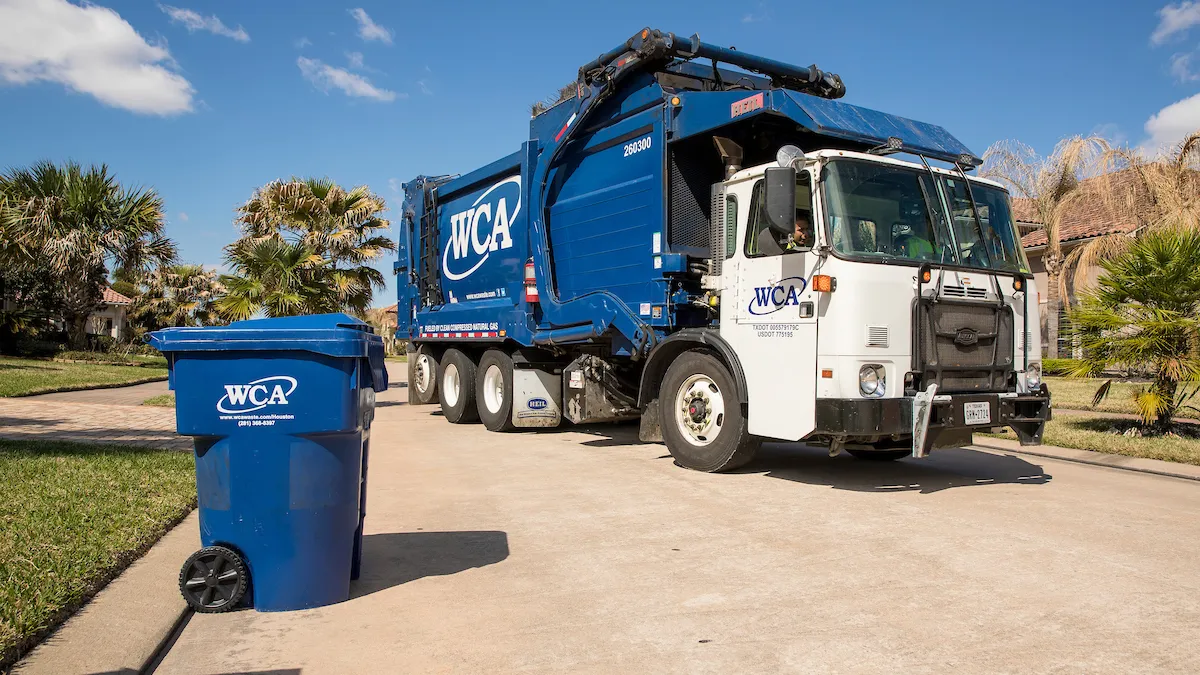UPDATE: October 1, 2020: GFL Environmental closed its acquisition of WCA Waste from a Macquarie Infrastructure and Real Assets (MIRA) fund for $1.212 billion today. The news follows recent regulatory approval by the U.S. Department of Justice, along with the private placement of $600 million in preferred shares to funds managed by HPS Investment Partners that also closed today. GFL now operates in 27 U.S. states, in addition to nine Canadian provinces.
The deal is complementary to GFL's pending acquisition of divestitures from Waste Management and Advanced Disposal Services. While the latter deal's timing was recently extended, CEO Patrick Dovigi said in a prior statement he expects to close on that transaction "early in the fourth quarter."
Dive Brief:
- GFL Environmental has signed a definitive agreement to acquire Texas-based WCA Waste from a MIRA fund for $1.212 billion. The deal is set to close in the fourth quarter pending regulatory approval. No divestitures are anticipated, CEO Patrick Dovigi said during a Thursday investor call.
- GFL now expects to mainly focus on integrating this and the pending $863.5 million Waste Management divestiture package over the next 12-18 months. “We are going to get back to our sort of bread and butter tuck-in acquisitions," said Dovigi, forecasting 25-30 deals per year. “Post-WCA, there is not another larger-scale opportunity that is on our horizon at the moment.”
- WCA's annual revenue is estimated to be $400 million, with operations across 11 states. This includes 22 landfills, 37 collection and hauling operations, over 1,000 collection vehicles, 27 transfer stations and three MRFs. According to GFL, Texas, Missouri and Florida account for 81% of WCA's revenue and collection accounts for 69% of its overall revenue.
Dive Insight:
GFL Environmental's significant expansion in the United States continues, with 2020 poised to become a pivotal year in the company's history as it picks up another one of the industry's largest private players. Pending regulatory approval for the transactions, GFL will operate in nine Canadian provinces and 27 U.S. states.
According to Dovigi, the two major deals have been in the works for more than a year and were "a big catalyst" behind the company's decision to launch an initial public offering (IPO) in March. GFL also announced supplemental financing through a $600 million equity offering with HPS Investment Partners, a prior investor, to fund this new transaction.
The company's footprint is seen as "highly complementary" to many of the Waste Management-Advanced Disposal Services assets being acquired in the Southeast, and will also have integration benefits with GFL's smaller Western portfolio acquired in the 2018 Waste Industries deal. In addition to its three key states, WCA also has assets in Colorado, New Mexico, Kansas, Oklahoma, Arkansas, Kentucky, Tennessee and Alabama.
Dovigi described many of these markets as a "blank canvas" for expansion, including future tuck-ins likely worth $1 million to $10 million in annual earnings before interest, taxes, depreciation and amortization (EBITDA).
While Dovigi said “WCA back in the day was a bit of a storied company with a lot of random assets all over the place," he credited the current leadership team with tightening that strategy and creating a portfolio of high-quality, "very difficult to replicate assets." The announcement was delayed to see how the company performed during the pandemic, but it has done "an exceptional job" so far, Dovigi said.
Founded in 2000 by the late Tom Fatjo, also the founder of Browning-Ferris Industries, WCA was publicly traded before Macquarie Infrastructure Partners (MIP) II took it private in 2012. According to MIRA, that deal was valued at approximately $526 million. Since then, the company divested non-strategic assets in areas such as Massachusetts while completing more than 35 acquisitions.
CEO Bill Caesar helped lead much of this growth after leaving Waste Management to take the role in 2014. Caesar did not respond to a request for comment about his own future, though a statement was included in a MIRA release.
“Over MIP II’s ownership, WCA has grown significantly, while also professionalizing the business, investing in people and systems to support our growth and to improve administrative and operational efficiency. I am very grateful to everyone in our WCA family and extraordinarily proud of the company that we have built together," Caesar said.
Macquarie's previous investment in GFL and Waste Industries was said to be a positive in terms of shared contacts and similar operating platforms. Dovigi said Waste Industries and WCA were slated to merge in 2012, but ran into regulatory barriers so MIRA maintained them as separate entities.
“It was just a matter of time before they come together and now we’ve assembled all these pieces and really made another national player," said Dovigi.
Following this deal, MIRA's U.S. current solid waste portfolio centers around its ownership of New Hampshire-based Wheelabrator, which has recently shifted to become a vertically-integrated player in the greater Northeast region.
GFL anticipates the Waste Management-Advanced transaction could receive regulatory approval in the coming weeks. That package recently expanded due to additions in the Jacksonville, Florida and Fort Wayne, Indiana markets, but WCA's footprint is not expected to complicate the approval process.
CFO Luke Pelosi said the two deals should drive double-digit free cash flow growth into 2021 and the company also released new 2020 guidance. GFL now anticipates revenue (in Canadian dollars) upward of $4.08 billion, adjusted EBITDA upward of $1.06 billion, cash flow from operating activities upward of $750 million and net loss as high as $459 million.
The GFL team said it was setting conservative expectations about growth – as well as expected synergies from the major pending deals – but Dovigi reiterated a pre-IPO goal to double the business within five years. Looking ahead, he forecast numerous M&A opportunities throughout North America that could further accelerate the company's rapid rise to become the fourth-largest player in the industry.











